Project management expertise is one of the most sought-after skills in the modern labor market. The PMP certification exam is one of the renowned ways for establishing proof of your skills in project management. As a matter of fact, the PMP exam is the top project management certification in the world presently.
With a focus on predictive, agile, and hybrid approaches, the PMP certification offers solid proof of project leadership experience alongside expertise in managing complex projects.
The PMP certification empowers the career prospects for project leaders in different industries while helping organizations identify the right talent for more thoughtful work and better performance.
The following discussion offers you detailed guidance on the PMP certification by the Project Management Institute (PMI).
Explore basic information about the exam alongside reasons to pursue the certification and steps for preparation, as well as information about the application process and FAQs.
Enroll Now: PMP Exam Practice Questions
Situational questions + knowledge-based questions that gives competitive edge.
200-question, multiple-choice exam
Know about the Project Management Professional (PMP) Exam?
The Project Management Professional or PMP certification is a globally recognized credential in the domain of project management. According to research, employers would come across the need to fill up 2.2 million new project-oriented roles annually till 2027. Therefore, you can notice the prolific demand for project managers.
The PMP exam has been developed under the supervision of project professionals for the career development of project professionals.
Candidates could prove that they are the best in terms of people, processes, and the business environment in general. The certification validates the soft skills required for effective leadership of a team in the rapidly evolving environment you can find today.
The PMP certification also validates the skills of candidates for reinforcing the technical aspects of successful project management. Most importantly, the PMP credential proves that qualified professionals could easily highlight the interplay between projects and the organization’s strategy.
PMP Exam Details
The next important detail regarding the PMI PMP certification points out the basic info about the exam:
- Total of 180 questions in the PMP examination.
- Interestingly, candidates should know that 5 questions out of the 180 questions would be pretest questions, which do not affect the score.
- The pretest questions serve as a proven and effective approach for verifying the validity of exam questions in the future.
- It is also important to note that you would not find any specific order of questions in the exam.
- Candidates will get a total of 230 minutes for completing the exam.
- Candidates would find a tutorial and a survey before they start with the examination, which is optional.
- The tutorial and the survey would take almost 5 to 10 minutes for completion, and the time is not included in the examination duration, i.e., 230 minutes.
- Candidates should also note that the Project Management Professional certification exam would have two 10-minute breaks.
You can get the first break after completing questions 1 to 60 and reviewing all the answers. You could get the second break after completing question 120 and reviewing all your answers.
However, candidates could not return to the questions of the previous section after reviewing responses and starting their break. Candidates would get the remaining allotted time for completing the remaining questions upon signing back after each break.
Know About New PMP 2021 Changes
The PMBOK® Guide – Seventh Edition
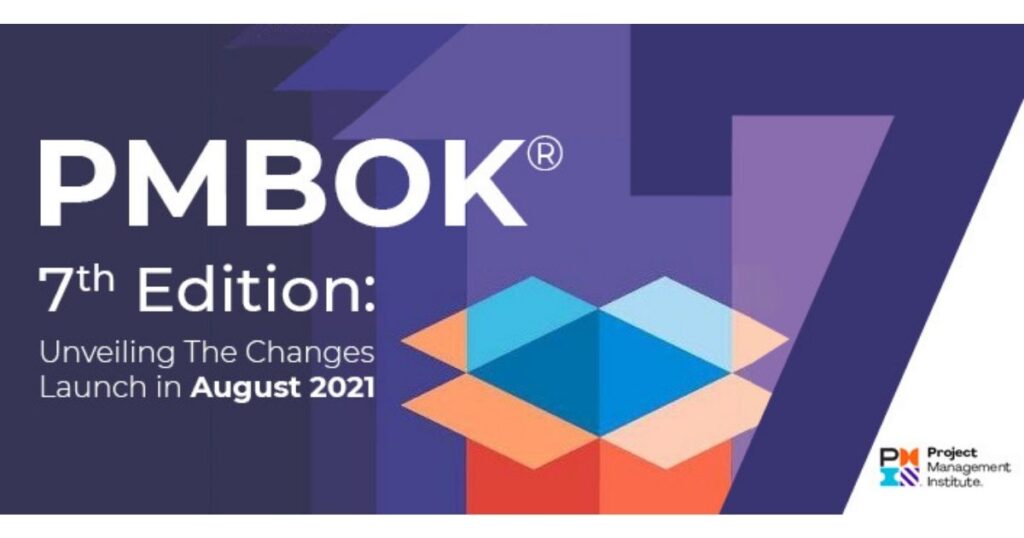
It was announced that the PMP Exam’s course work would be changing from 1 January 2021 by the Project Management Institute.PMI announced the release of the PMBoK® Guide 7th edition in August 2021.
The PMBOK® Guide: Seventh Edition, which includes a revised The Standard for Project Management, will support this need for flexibility by adopting a principle-based structure for the standard and performance domains for the guide, in place of Process Groups and Knowledge Areas.
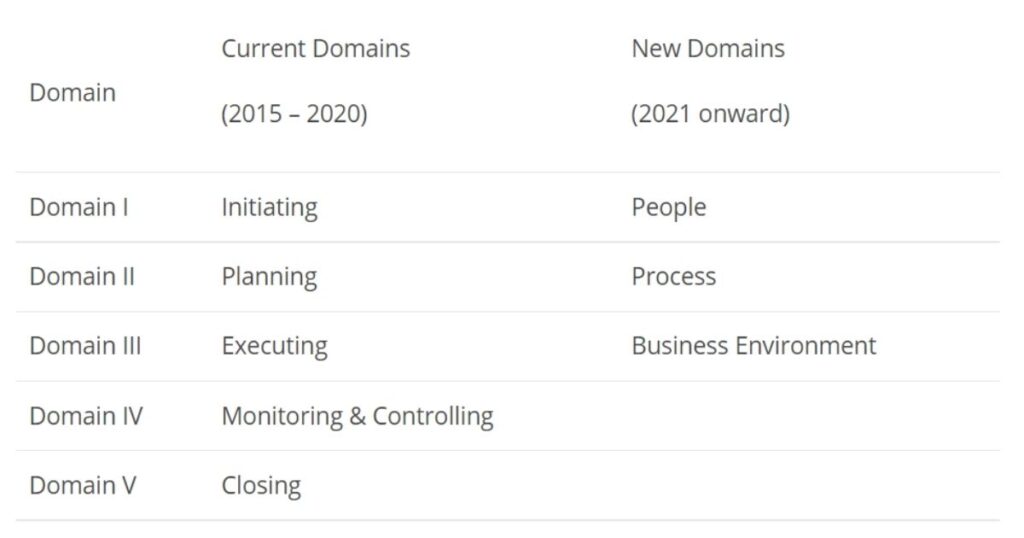
PMP Seventh Edition book link : https://pmi.bookstore.ipgbook.com/
How PMP Evolved ?

- PMI changed the PMP exam in 2015, wherein more than 25% of the exam content was updated.
- In June 2019, the PMI published the new PMP Exam content outline.
- 31 December 2020 – Last day to take the current version of the PMP Exam
- 2 January 2021 – First day to take the new version of the PMP Exam
The PMBoK® Guide: Seventh Edition will be available from 1 August 2021.
The PMBoK® Guide – 7th Edition will be printed in English and translated into Arabic, Chinese (simplified), French, German, Italian, Korean, Brazilian Portuguese, Russian and Spanish.
The price of the PMP Guide 7th edition is $99.However, for PMI members, it is free(digital copy), and if they want to buy it, they can get it at a discounted rate.
Message from PMI :
The PMBOK® Guide – Seventh Edition
For years, A Guide to the Project Management Body of Knowledge (PMBOK® Guide) has been the go-to resource for helping practitioners use best practices to deliver value on the job.
However, rapid enhancements in technology and the need for organizations and practitioners to adapt more quickly to changes in the market have caused our profession to evolve. Practitioners are now tasked with identifying the right delivery approach (predictive, adaptive, or hybrid) to get the job done and deliver value. To make sure the PMBOK® Guide – Seventh Edition remains relevant, it must reflect this flexibility and assist the practitioner in managing the project at hand to deliver outputs that enable envisioned outcomes.
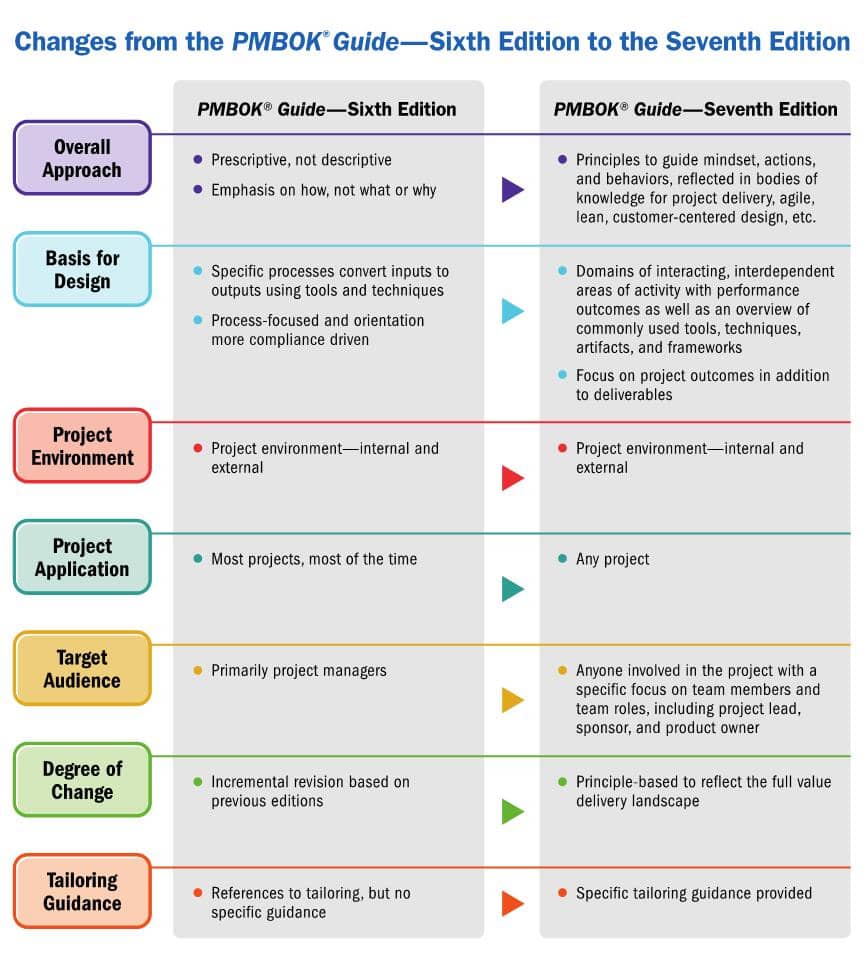
PMP Exam Fee
Member: ₹23,459.00 | $405.0
Non-member: ₹42,863.00 | $555.0
Retake Policy for the PMP Certification Exam!
The retake policy for the PMP exam is also another promising highlight for candidates. PMI allows candidates to take the examination up to three times in the eligibility period of one year. If you don’t qualify for the three attempts, then you have to wait for one year from the date of the last examination attempt before applying again for the PMP certification.
You can expect scenario-based questions in the PMP exam. Practice for the PMP exam with these PMP practice tests to get ready for the exam!
Domains Covered in the Exam
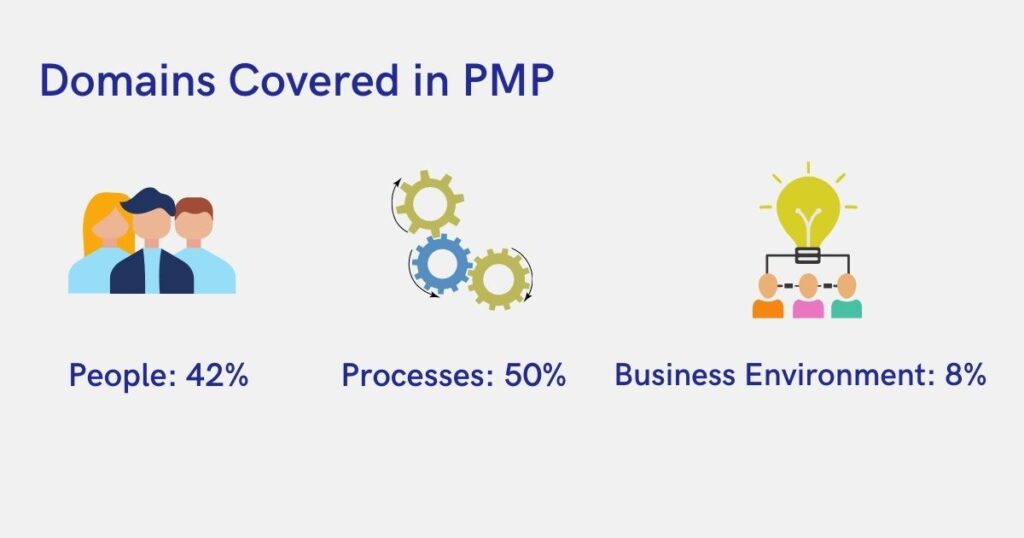
As mentioned already, a PMP-certified professional can showcase their skills in people, processes, and the business environment.
Candidates should understand the weightage of questions in each domain for defining the scope of their preparation efforts. Here is an outline of the three domains covered in the PMP certification exam, along with their respective weightage:
- People: 42%
- Processes: 50%
- Business Environment: 8%
The outline of domains for PMP exam preparation should also include a focus on the associated tasks and enablers. Each domain represents the high-level knowledge area required for practicing project management.
The tasks in a specific domain point out the underlying responsibilities for project managers in the concerned domain.
Enablers for the tasks in PMP certification exam domains are illustrative examples of the work involved in the concerned task. It is important to note that enables only offer some examples for understanding the scope of a particular task.
Here is an overview of the tasks covered in each domain of the PMP certification exam:
People
The tasks covered in the “People” domain of the Project Management Professional certification exam include the following:
- Conflict management
- Team leadership
- Supporting team performance
- Empowering team members and stakeholders
- Ensuring adequate training of members and stakeholders
- Team building
- Resolving and removing obstacles, blockers, and risks for the team
- Negotiation of project agreements
- Collaboration with stakeholders
- Development of shared understanding
- Engaging with and supporting virtual teams
- Definition of ground rules for the project team
- Mentoring the relevant stakeholders
- Applying emotional intelligence for promoting team performance
Process
Candidates would have to cover the following tasks in the “Process” domain for successful PMP exam preparation:
- Execution of projects with urgency for delivering business value
- Management of communications with all stakeholders
- Risk assessment and management
- Stakeholder engagement
- Budget and resource planning and management
- Schedule planning and management
- Planning and management of the quality of products or deliverables
- Planning and managing the scope of the project
- Integration of project planning activities
- Management of changes in the project
- Procurement planning and management
- Project artifact management
- Identification of suitable project methodologies or methods and best practices
- Setting up the governance structure for the project
- Management of project issues
- Facilitating knowledge transfer to ensure project continuity
- Planning and management of closure and transitions for the project and individual phases
Business Environment
The “Business Environment” domain in the PMP exam would focus on the following tasks:
- Planning and management of project compliance
- Evaluation and delivery of project benefits with the desired value
- Assessment and adaptability to changes in external business environment for influence on the scope
- Supporting organizational change
Check how this 5-Step PMP Certification preparation plan can help you pass the exam on the first attempt.
Why should you go for a PMP Certification?
When you seek information about becoming a PMP certified professional, you are likely to look for reasons to pursue the certification. Here are some of the notable reasons you should consider for starting your preparations for PMP certification:
- The PMP certification is not limited to a specific sector or industry. As a result, certified professionals could get the chance to work in sectors of their choice, ranging across various options such as healthcare, governance, IT, and others.
- A certified Project Management Professional could find new avenues for better earning potential. According to PMI, the median salary for PMP certified professionals was almost 25% higher than for non-certified professionals.
- With a PMP certification, professionals could earn an average annual salary of almost $115,000.
- The next important reason to choose the PMP certification points out the massive community of project management professionals. Professionals in over 200 countries have already achieved and maintained their PMP certification regularly. When put clearly in numbers, the global PMP community includes more than a million certified professionals. You could also achieve global recognition in project management by becoming a part of the large global community.
- Candidates who have qualified for the PMP exam must follow certain conditions for maintaining their certification. Therefore, qualified candidates would have to continue on the journey of continuous learning while adapting to emerging project management needs.
- The PMP certification showcases your commitment to improving expertise across various skills, approaches, and technologies required in project management.
- The majority of Project Management Professional or PMP actual exam focus on building teams and leading people.
- The scope of modern project management approaches focuses mainly on people and leading them as a single entity to achieve desired goals.
- The PMP certification empowers professionals to identify the strengths and weaknesses of their team members to bring them together for the project.
Step By Step Guide for PMP Exam Preparation
Now that you know the basic information about PMI PMP certification, you might be eager to learn the important pointers for preparation. Here are some proven and recommended exam tips by experts that can quickly help you qualify for the PMP certification.
Know Your Goals
When you have a clear idea of the finish line, you are more likely to prepare well for the race.
The same is applicable in the case of PMP exam preparation. Establish clear goals about earning the PMP certification and focus on the goals throughout the preparation process.
Try out the following suggestions in line with your PMP certification goals:
- Make sure that you have a plan for studying regularly in the weeks or months before the exam.
- Develop a study plan which works well with your professional and personal responsibilities.
- Ensure that others know about your goals so that they can help you in your journey.
- Look for opportunities for support from your organization for studying during work hours.
Review the Exam Terrain Thoroughly
Candidates could easily make their way towards becoming a PMP certified professional by carefully taking note of the exam outline.
You need to understand the significance of each domain in the role of project management professionals. At the same time, you should dive deeper into the tasks covered in each domain along with their respective enablers. As a result, you can know what type of tasks you can expect in the PMP certification exam questions.
Furthermore, an overview of the number and format of questions could improve the confidence of candidates to appear for the exam.
Discover Resources for Preparation
The preparation of candidates for the PMP exam can be utterly difficult without the relevant training resources. However, many candidates often struggle with the identification of suitable sources to get the desired training resources.
The local PMI chapters could help find a study group, and authorized training providers could effectively guide you. If you have any doubts, start with the commonly recommended source for PMP exam preparation, i.e., the PMBOK Guide. You can also explore some good recommendations for learning resources on ProjectManagement.com.
Also Check: Detailed Preparation Guide for PMI PMP Certification
Application Process / Eligibility criteria for PMP
Candidates preparing for the PMP certification should also know about the exam application process in detail. The first thing you should note before applying for Project Management Professional certification is the eligibility for PMP certification.
Candidates should fulfill certain education requirements and relevant experience in project management. Most importantly, candidates must have achieved the desired project management experience in the eight years before applying for the exam. The eligibility requirements for the PMP certification exam are as follows:
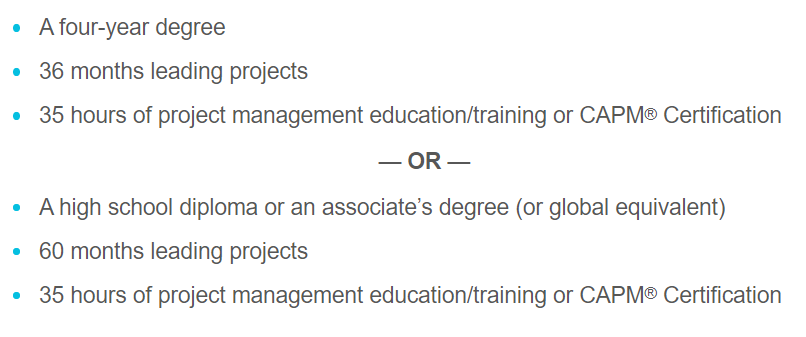
| Educational Qualification | Project Experience |
| Secondary degree | At least 5 years of unique professional management experience in non-overlapping projects. |
| OR | |
| Four-year degree | At least 3 years of unique professional management experience in non-overlapping projects. |
| OR | |
| Bachelor’s or Post-graduate degree from GAC accredited program | At least 2 years of unique professional management experience in non-overlapping projects. |
Candidates have to use the experience verification section in the online application for recording their experience. You would have to enter the number of months in project management experience along with the contact hours of project management education.
Finally, you must also enter information about your educational qualifications before applying. PMI aims at processing applications within five calendar days. The final aspect in the application process is the payment which depends on regional and membership pricing rules. Once you have completed the payment, you have completed the application process.
FAQ’s on PMP

What is the role of a PMI Certified PMP professional?
The PMP Certified professional serves the following important roles in project management lifecycles:
- Development of ideas
- Team building and allocation of roles
- Organization and coordination of the plan
- The leadership of the team
- Budgeting and resource management
- Managing communication among team members and stakeholders
How is a PMP professional responsible for the success of a project?
A certified project management professional has the capability and knowledge for ensuring alignment between people, processes, and the business environment for a concerned project.
Building the right teams and empowering processes with technical fluency, and optimizing the business environment according to changing project requirements play a huge role in project success.
Who can all go for PMP certification?
The eligibility requirements for PMP certification help in finding whether you can take the exam or not.
PMP certification requirement:
- Secondary degree with a minimum of 5 years of experience in professional non-overlapping project management.
- Four-year degree with at least 3 years of experience in professional non-overlapping project management.
- Bachelor’s or Post-graduate degree from GAC accredited programs with at least 2 years of experience in professional non-overlapping project management.
- 35 hours of project management education/training or CAPM® Certification
Where is PMP implemented?
Organizations that leverage project management techniques to their advantage include American Airlines and The Royal Bank of Scotland. The example of American Airlines shows the use of portfolio and resource management techniques while The Royal Bank of Scotland utilizes project management for decommissioning legacy systems.
Do we need a PMP professional?
Research by the Project Management Institute has suggested that employers would have to fill almost 2.2 million new project-based roles every year. At the same time, the constantly evolving nature of business needs also presents a favorable case for bringing PMP professionals.
Have queries about the PMP certification exam? Participate in PMP discussions on our Forums. Click here.
Final Words
Based on the information about the PMP exam, it is clear that preparing for the exam can be difficult. However, you could learn about the basic information of the exam content for improving your knowledge of the exam. Subsequently, you could leverage the best practices recommended by experts to qualify for the exam with ease.
Most important of all, candidates must focus on the eligibility requirements for the certification. Furthermore, you should also find the ideal Project management training provider with proven resources to help you cross the finish line. Learn more about the PMP certification and start your preparations right now!
Don’t forget to check out Preparation Journeys that are contributed by certified professionals aka community members to help each other – You can be a part of it as well!
Disclaimer: ReviewNPrep does not own (and is not affiliated to) PMI, PMP or PMBOK logos or trademark.
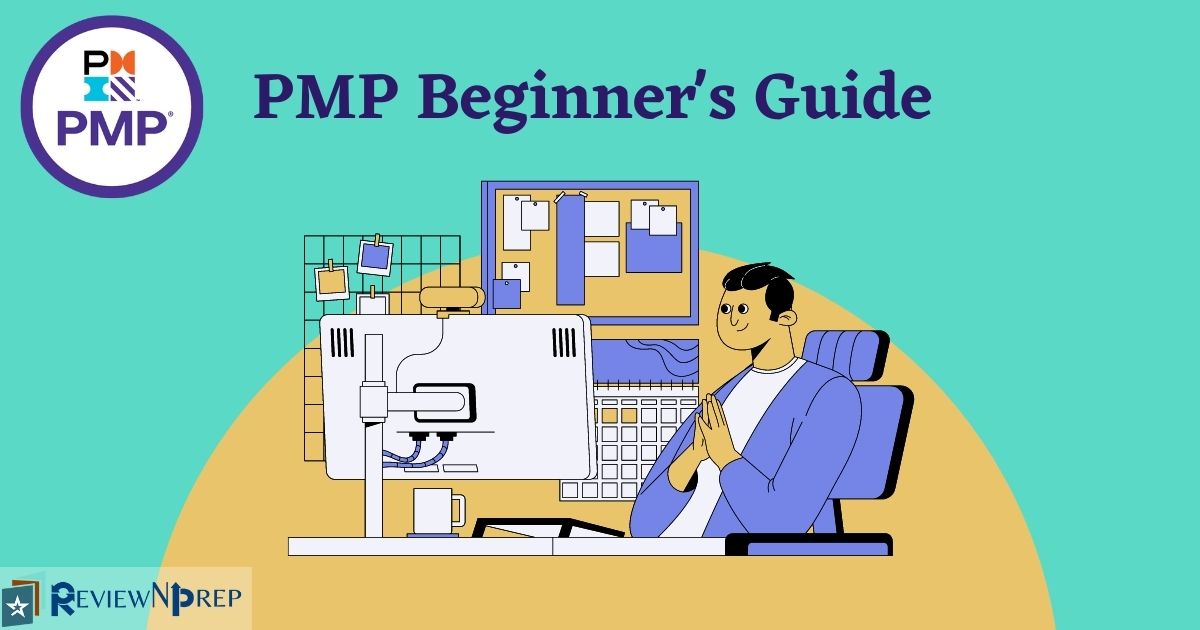

[…] Read: Beginner’s Guide on PMP Certification Exam […]